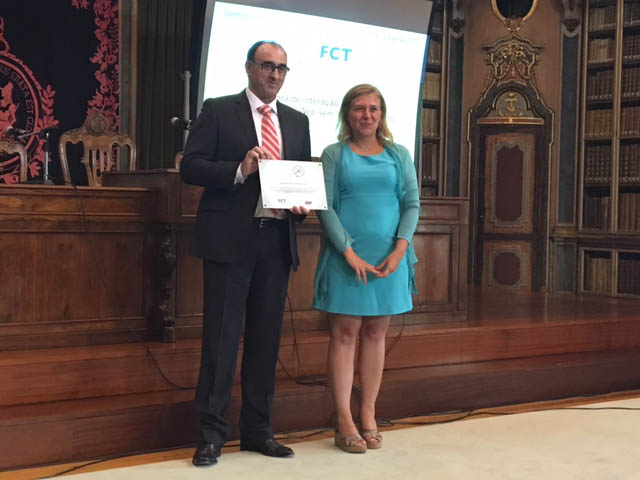FCT promotes inclusion and digital literacy among Portuguese citizens

An "Integrated System for Increasing the Autonomy of Blind People" is a mobile digital platform developed at the Institute for Systems and Computer Engineering, Technology and Science – INESC TEC, designed for blind or visually impaired people. Along the same lines of research, an electronic cane was developed to facilitate the mobility of these people, as well as an application that allows them to receive geographical information via their cell phone. The availability of these technologies aims to facilitate the inclusion of blind people in digital society, as well as contribute to improving their quality of life. The idea was presented by João Barroso, project coordinator and researcher at INESC TEC.
 With people with mental disabilities in mind, Tânia Rocha, from the University of Trás-os-Montes and Alto Douro (UTAD), presented a project entitled "Accessible interaction metaphor for web browsing without the use of text." As part of her doctoral thesis, the researcher developed a digital environment based on iconic language that makes websites more accessible and allows the target audience to explore electronic information independently.
With people with mental disabilities in mind, Tânia Rocha, from the University of Trás-os-Montes and Alto Douro (UTAD), presented a project entitled "Accessible interaction metaphor for web browsing without the use of text." As part of her doctoral thesis, the researcher developed a digital environment based on iconic language that makes websites more accessible and allows the target audience to explore electronic information independently.
The program included the presentation of the results and impact of two of the projects awarded in 2014: the "LIDIA Project - Adult Digital Literacy," led by Joana Viana from the Institute of Education at the University of Lisbon, and the "AccessWeb, Web Accessibility Barometer in Portugal" project coordinated by Ramiro Gonçalves from INESC TEC.
To help characterize and understand the evolution of digital literacy levels in the various regions of our country (Regional Digital Index), updated data from the study conducted at the University of Minho by Luís Miguel Ferreira, in "Regional Asymmetries of the Information Society in Portugal," were also released. The session continued with the presentation "Future Scenarios for the Information Society in Portugal" by Luís Vidigal, from the Association for the Promotion and Development of the Information Society (APDSI).
It should be noted that the Inclusion and Digital Literacy Award is promoted by FCT, as patron of the ICT and Society Network for the coordination of public policies for the Information and Knowledge Society in Portugal. It aims to support innovative initiatives in the area of digital inclusion and literacy, which serve as models of good practice, with the capacity for replication or expansion to other regions and/or other population groups.
The 2015 edition received 58 applications from entities with projects in the field of digital citizenship. The promoters of the winning projects will receive a total of €50,500 to boost their innovative ideas and launch them on the market.
The ILD 2015 awards ceremony held at the Lisbon Academy of Sciences was attended by Ana Sanchez, Member of the FCT Board of Directors, and Ana Neves, Head of the FCT Information Society Department.